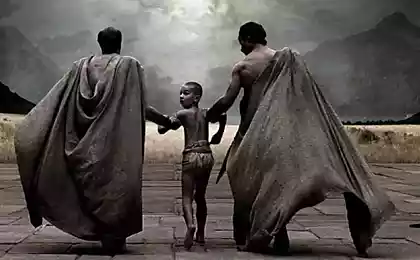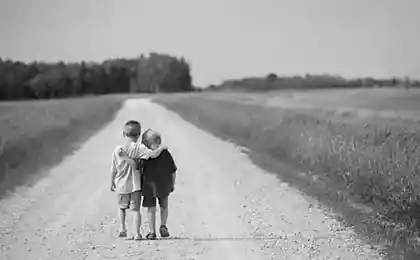459
Misconceptions men about the role of the father
Fifteen million eighty one thousand four hundred fifty
In our society it is not accepted to teach selevedenie and to prepare for the role of spouses and parents. So everyone comes up as you can, focusing most often on the example of the parent family, like living entourage and the media. Or is on the path of self-education, but it is with the original understanding of the importance of this topic.
In this article I want to address incorrect stereotypes of men regarding their role as a father.These stereotypes are mainly related to incorrect understanding of the content and the essence of the role of the father and are a direct consequence of a lack of understanding of psychological aspects of raising children.
1. The rejection of the educational function along with his wife and taking only the family. "Feed, sing, dress, and upbringing has been let mother." Wrong position, which in our society is especially evident in the deformation of the education of boys women methods. And the girls this creates a distorted view of the relationship with a man (after all, the first man a girl is her dad).
2. The expectation that the child is something to be a father for granted. "I am your father, so you must love me and respect." Over time, this unit generates a strong emotional distance between child and father because child is not feeling properly and resists. And in the application of violence is generally closed.
3. "Everything should be as people". Rejection individualities of their own, their family and their child. Snapping the child to the Procrustean bed of their perceptions of "normality". Of course, without considering the desires, capabilities and aspirations of the child.
4. "Against scrap no reception". The tendency to resolve the situation by force. Consequences can include child aggression with peers, anxiety, low self-esteem and depression, the desire to achieve all the power — as the only way of solving problems.
5. I'm a man! The rejection of interaction with child is not a male way of communication because it is "women's business". The fear of losing his masculinity in this. Reflected in the lack of softness, empathy, willingness to put the child on equal terms, to recognize his identity.
6. Ignoring personal communication with the child. The expression of love through gifts and money. The result of this training, the Teens fall into bad company, because there communicate with them and appreciate them. Also, they experience various depression from lack of attention and emotions from their parents, may begin to behave badly, to at least so emotionally pulseinterval with his father. The boys often appears low self-esteem, a sense of uncertainty and insecurity.
7. Jealousy of the wife to the children. The perception of children as rivals in the possession of a wife. As a result, or emotional distance, and no recognition of a father (only her husband), or falling to the position of "youngest child."
Significantly reduce the impact of stereotypes on the behavior and the position of the father is possible through education:
The extreme importance of participation of men in the educational process.
Equal responsibility of parents for what will come of the baby in the end
Age-related needs of the child in the father and mother
Age-related peculiarities, abilities and opportunities child
About ways of interaction with a child without causing (unwittingly) psychological trauma.
Well, at least.
Author: Catherine Goncharuk
Source: /users/1077
In our society it is not accepted to teach selevedenie and to prepare for the role of spouses and parents. So everyone comes up as you can, focusing most often on the example of the parent family, like living entourage and the media. Or is on the path of self-education, but it is with the original understanding of the importance of this topic.
In this article I want to address incorrect stereotypes of men regarding their role as a father.These stereotypes are mainly related to incorrect understanding of the content and the essence of the role of the father and are a direct consequence of a lack of understanding of psychological aspects of raising children.
1. The rejection of the educational function along with his wife and taking only the family. "Feed, sing, dress, and upbringing has been let mother." Wrong position, which in our society is especially evident in the deformation of the education of boys women methods. And the girls this creates a distorted view of the relationship with a man (after all, the first man a girl is her dad).
2. The expectation that the child is something to be a father for granted. "I am your father, so you must love me and respect." Over time, this unit generates a strong emotional distance between child and father because child is not feeling properly and resists. And in the application of violence is generally closed.
3. "Everything should be as people". Rejection individualities of their own, their family and their child. Snapping the child to the Procrustean bed of their perceptions of "normality". Of course, without considering the desires, capabilities and aspirations of the child.
4. "Against scrap no reception". The tendency to resolve the situation by force. Consequences can include child aggression with peers, anxiety, low self-esteem and depression, the desire to achieve all the power — as the only way of solving problems.
5. I'm a man! The rejection of interaction with child is not a male way of communication because it is "women's business". The fear of losing his masculinity in this. Reflected in the lack of softness, empathy, willingness to put the child on equal terms, to recognize his identity.
6. Ignoring personal communication with the child. The expression of love through gifts and money. The result of this training, the Teens fall into bad company, because there communicate with them and appreciate them. Also, they experience various depression from lack of attention and emotions from their parents, may begin to behave badly, to at least so emotionally pulseinterval with his father. The boys often appears low self-esteem, a sense of uncertainty and insecurity.
7. Jealousy of the wife to the children. The perception of children as rivals in the possession of a wife. As a result, or emotional distance, and no recognition of a father (only her husband), or falling to the position of "youngest child."
Significantly reduce the impact of stereotypes on the behavior and the position of the father is possible through education:
The extreme importance of participation of men in the educational process.
Equal responsibility of parents for what will come of the baby in the end
Age-related needs of the child in the father and mother
Age-related peculiarities, abilities and opportunities child
About ways of interaction with a child without causing (unwittingly) psychological trauma.
Well, at least.
Author: Catherine Goncharuk
Source: /users/1077
























